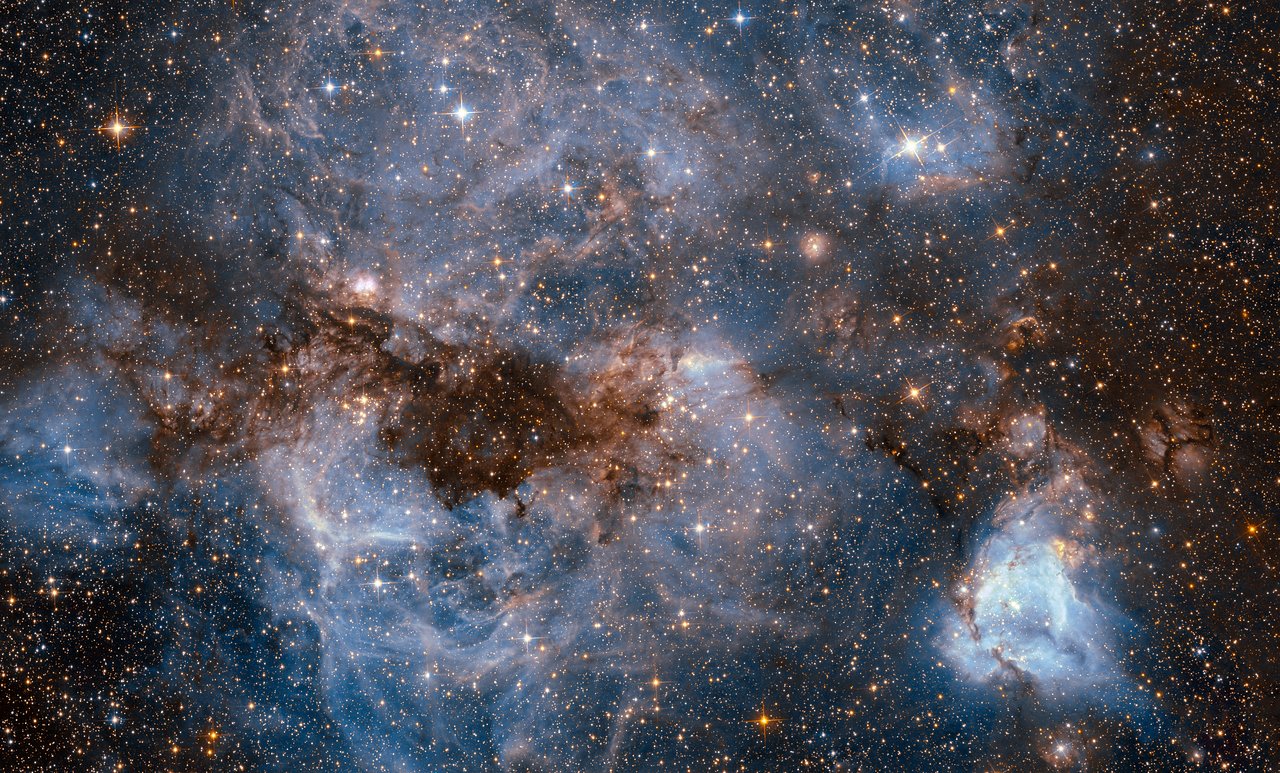Stellar Storm Cloud
ω
A satellite galaxy of Milky Way,
which is labeled the Large Magellanic Cloud,
bears the name of the person known to this day
for first earth circumnavigation avowed.
While he perished before the voyage ended,
Magellan gave the cosmic complex its fame,
though at least two others could have contended
that theirs were the sightings with earlier claim.
Some say it’s a dwarf, not assemblage full-fledged,
albeit in scope quite colossal en masse,
with billions of astral groups inside it wedged.
This detail of the maelstrom of dust and gas
is a Hubble picture of N159
showing nursery vista sidereal
where torrential stellar winds carved the design
in sculpted ridges and arcs ethereal.
The ionized hydrogen ‘H-two’ region
over one hundred fifty light-years across,
whose births and collapses of stars are legion,
has a look of glowing empyreal gloss,
with a butterfly-shaped ‘Papillon’ subsumed,
as if cloud within cloud, called a ‘compact blob’,
above left of center with wings astro-groomed,
a tumultuous cauldron fiercely athrob.
Having laid out that lengthy exposition,
I sense it’s time for more lyrical phrases
in my chosen rhythm and rhyme tradition
to sing this celestial image’s praises.
The depiction by Hubble, “Into the storm”
dramatizes the violent astral blasts,
as does Shakespeare’s King Lear in majestic form
conjure raging tempests that ‘crack nature’s casts’.
Joseph Conrad’s poetic prose comes to mind,
plus the greatness of his prowess linguistic,
with those works that illuminate all mankind
in line after line of grandeur artistic.
The novella “Typhoon” evokes emotion
through haunting specter of ‘smashed vial of wrath’
as likened to gale on furious ocean,
while the mundane MacWhirr steers unveering path
straight into and through that unbridled bluster—
a masterpiece by tale-spinning magician
with vivid sketch of a captain lackluster.
Oh, woe to our purblind human condition!
That cyclonic capture of cosmical theme
from Advanced Hubble Camera for Surveys
is part of the whole in an infinite scheme
where galaxies dance in a vast polonaise.
From perspective of space it appears serene
on the tiny blue dot of system solar,
but our actions create a turbulent scene
in these times of feats and follies bipolar.
While there is still strength in my body mortal
or sparkle of life in this temporal guise,
I’ll aspire to enter through the true portal
of the inner realm where enlightenment’s lies,
unfathomable as stelliferous skies,
with a pure seeking spirit that never dies…
~ Harley White
* * * * * * * * * *
Inspiration was derived from article with image
Into the storm...
Also, Image: Hubble peers into the Large Magellanic Cloud...
Also, Astronomy Picture of the Day ~
N159 in the Large Magellanic Cloud...
In addition, there were some literary inspirations mentioned in the poem, namely William Shakespeare and Joseph Conrad…
The poem particularly refers to Chapter 3 in Conrad’s “Typhoon” ~ For anyone interested, here is a link to the entire novella (with links to contents at upper left)…
Further inspiration derived from the teachings and writings of Nichiren Daishōnin…
Nam Myōhō Renge Kyō means to devote our lives to and found them on (Nam[u]) the Utterness of the Dharma (Myōhō) [entirety of existence, enlightenment and unenlightenment] permeated by the underlying white lotus flower-like mechanism of the interdependence of cause, concomitancy and effect (Renge) in its whereabouts of the ten [psychological] realms of dharmas [which is every possible psychological wavelength] (Kyō).
The reason that we continually recite Nam Myōhō Renge Kyō
Image and explanation ~ N159 in the Large Magellanic Cloud
Explanation: Over 150 light-years across, this cosmic maelstrom of gas and dust is not too far away. It lies south of the Tarantula Nebula in our satellite galaxy the Large Magellanic Cloud a mere 180,000 light-years distant. Massive stars have formed within. Their energetic radiation and powerful stellar winds sculpt the gas and dust and power the glow of this HII region, entered into the Henize catalog of emission stars and nebulae in the Magellanic Clouds as N159. The bright, compact, butterfly-shaped nebula above and left of center likely contains massive stars in a very early stage of formation. Resolved for the first time in Hubble images, the compact blob of ionized gas has come to be known as the Papillon Nebula.

Credit: NASA, ESA, Hubble Space Telescope
| Table of Contents |
|